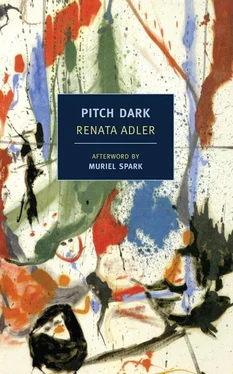Renata Adler - Pitch Dark
Здесь есть возможность читать онлайн «Renata Adler - Pitch Dark» весь текст электронной книги совершенно бесплатно (целиком полную версию без сокращений). В некоторых случаях можно слушать аудио, скачать через торрент в формате fb2 и присутствует краткое содержание. Год выпуска: 2013, Издательство: NYRB Classics, Жанр: Современная проза, на английском языке. Описание произведения, (предисловие) а так же отзывы посетителей доступны на портале библиотеки ЛибКат.
- Название:Pitch Dark
- Автор:
- Издательство:NYRB Classics
- Жанр:
- Год:2013
- ISBN:нет данных
- Рейтинг книги:3 / 5. Голосов: 1
-
Избранное:Добавить в избранное
- Отзывы:
-
Ваша оценка:
- 60
- 1
- 2
- 3
- 4
- 5
Pitch Dark: краткое содержание, описание и аннотация
Предлагаем к чтению аннотацию, описание, краткое содержание или предисловие (зависит от того, что написал сам автор книги «Pitch Dark»). Если вы не нашли необходимую информацию о книге — напишите в комментариях, мы постараемся отыскать её.
Pitch Dark Composed in the style of Renata Adler’s celebrated novel
and displaying her keen journalist’s eye and mastery of language, both simple and sublime,
is a bold and astonishing work of art.
Pitch Dark — читать онлайн бесплатно полную книгу (весь текст) целиком
Ниже представлен текст книги, разбитый по страницам. Система сохранения места последней прочитанной страницы, позволяет с удобством читать онлайн бесплатно книгу «Pitch Dark», без необходимости каждый раз заново искать на чём Вы остановились. Поставьте закладку, и сможете в любой момент перейти на страницу, на которой закончили чтение.
Интервал:
Закладка:
Well, what did you pull out ahead of me on the road for, from a side street, when there were no other cars in sight behind me, if you were going to drive more slowly than I did?
It was early evening, in the city. The TV was on. We watched The Newlywed Game. The moderator had just asked the contestant, a young wife from Virginia, What is your husband’s least favorite rodent? “His least favorite rodent,” she replied, drawling serenely and without hesitation. “Oh, I think that would have to be the saxophone.”
He knew that she had left him when she began to smoke again.
Is that where it begins?
I don’t know. I don’t know where it begins. It is where I am.
I know where you are. You are here. She had left him, then?
Years ago, he had smoked, but not when they met. So she stopped, as people do when they are in love. Take up cigarettes, or give them up, or change brands. As people do to be at one at least in this. Long after that, she began to smoke again.
So he knew she had left him?
Not knew, not left. Not right away, or just at first.
Why don’t you begin then with at first?
Look, you can begin with at first, or it seems, or once upon a time.
Or in the city of P.
Or in the city of P. In the rain. But I can’t. It is not what I know how to do.
Well, you must get these things straight, you know, resolve them in your mind before you write them down.
From the moment she knew that she was going to leave him, she started to look old. There was about her a sudden dimming, as in a bereavement or an illness, which in a way it was. He. They. Look, I would start short, if I could, with something shorter. The story of the boy, for instance, who did not cry wolf. Except that, of necessity, we can have no notion of that story, since the boy of course is dead.
So is the one who did cry wolf.
True, but he lasted longer.
Probably. I suppose that’s right. He knew that she was going to leave him when she began to smoke again.
You can rely too much, my love, on the unspoken things. And the wry smile. I have that smile myself, and I’ve learned the silence, too, over the years. Along with your expressions, like No notion and Of necessity. What happens, though, when it is all unsaid, is that you wake up one morning, no, it’s more like late one afternoon, and it’s not just unsaid, it’s gone. That’s all. Just gone. I remember this word, that look, that small inflection, after all this time. I used to hold them, trust them, read them like a rune. Like a sign that there was a house, a billet, a civilization where we were. I look back and I think I was just there all alone. Collecting wisps and signs. Like a spinster who did know a young man once and who imagines ever since that she lost a fiancé in the war. Or an old fellow who, having spent months long ago in uniform at some dreary outpost nowhere near any country where there was a front, remembers buddies he never had, dying beside him in battles he was never in.
Hey, wait.
All right. There was, of course, a public world as well.
I was there, in Montgomery, Alabama, on a summer’s day in the late seventies, when the Attorney General of the United States, a Southerner himself, spoke at the ceremony in which a local judge, who had worked for more than twenty years, with courage and humanity and in virtual isolation, on the federal district court, was promoted to the Fifth Circuit Court of Appeals. That court, like the district court under the local judge, had been a great court, decent, honorable, articulate and brave. The Attorney General himself had, for some years, been a member of it — quite often, as it happened, in dissent. Here he was, though, in the late seventies, the Attorney General, Old Mushmouth, as the wife of one of the court’s more distinguished judges had always, somewhat injudiciously and in his absence, called him, here he was, the Attorney General of the United States, speaking at the inauguration of a great federal district judge into a great federal appellate court. He mentioned the Ku Klux Klan. He alluded to it several times, the Klan. And each time, he referred to its membership, the members of the Klan, he called them. Clamsmen. No question about it, that’s how he pronounced it. Clamsmen. It was no reflection on the Attorney General. True, the judge’s wife had never thought much of his diction. True, in the court’s most important decisions, he had been so often in dissent. But years had passed. He had come to speak well and to do honor. And this business of the Clamsmen, well, it may have had to do with molluscs, bivalves. Even crustaceans. I remember a young radical, in the sixties, denouncing her roommates as prawns of imperialism.
Alone. What an odd gloss we have here on Alone at last. Since alone at last, for every hero in a gothic, every villain in a melodrama, traditionally assumes a cast of two.
You know I hate wisecracks.
So do I.
One morning, in the early nineteen-eighties, Viola Teagarden filed a suit in a New York State court against Claudia Denneny for libel. Also named as defendants were a public television station and a talk-show host. Viola Teagarden’s lawyer, Ezra Paris, had been, all his life, a civil libertarian; in every prior suit, he had been on the side of the right to speak, to print, to publish. He was embarrassed by Teagarden v. Denneny et al., which, as he knew, had no legal merit. He justified it to himself on grounds, of which Viola had persuaded him, that she was sad, hurt, pitiable, distraught. He also thought, in friendship, that he owed her something. Her current book was dedicated to him. But his province had always been the First Amendment, and he preferred not to think about who was paying his rather considerable legal fees, Martin Pix, a young, immensely rich, vaguely leftish media executive, who had recently come, yacht and fortune, into Viola’s special circle. That circle, as I gradually came to understand, was one of the most important cultural manifestations of its time.
Look here, you know, look here. All the things she had too much class to mention were the things he never knew.
Well, but that’s the point. I mean, it hardly takes much class not to mention things if he already knows them anyway.
It was as though he had been born in the presence of the doubt, the censor, the laugher at serious things, the unlaughing member in the audience of a comedian, the voluble warner against places where there is no danger, the reticent giver of directions toward a place through which no one has safely passed. The check was forever less than half a step behind the impulse. Clamped to the hoof of the Arabian horse of thought, report, or feeling, there were always the teeth of the question: is this altogether true? The least of the harm in it was the waste of energy and attention, in having always to be doubly sure, in letting pass the moments of high possibility, in seldom taking action, in having always just a bit to understate and overprove.
Wait, wait, wait, wait. Can you not avoid, on the one hand, the florid, overly elaborate, on the other hand, the arid exploration of that after all limitless desert rock of desolation called Square One?
What are you, some sort of anti-claque?
Sometimes he loved her, sometimes he was just amused and touched by the degree to which she loved him. Sometimes he was bored by her love and felt it as a burden. Sometimes his sense of himself was enhanced, sometimes diminished by it. But he had come to take the extent of her love as given, and, as such, he lost interest in it. She may have given him this certainty too early, and not just out of genuine attachment. One falls out of gradations of love and despair, after all, every few days, or months, or minutes. With courtesy, then, and also for the sake, for the sake of the long rhythms, she kept the façade in place and steady, unaffected by every nuance of caring and not caring. He distrusted her sometimes, but on the wrong grounds. He thought of her as light with the truth, and lawless. And she, who was not in other ways dishonest, who was in fact honorable in his ways and in others, was perhaps dishonest in this: that not to risk losing him, or for whatever other reason, she concealed, no, she did not insist that he see, certain important facets of her nature. She pretended, though with her particular form of nervous energy she was not always able to pretend this, that she was more content than she was, that her love for him was more constant than, within the limits that he set, it could be.
Читать дальшеИнтервал:
Закладка:
Похожие книги на «Pitch Dark»
Представляем Вашему вниманию похожие книги на «Pitch Dark» списком для выбора. Мы отобрали схожую по названию и смыслу литературу в надежде предоставить читателям больше вариантов отыскать новые, интересные, ещё непрочитанные произведения.
Обсуждение, отзывы о книге «Pitch Dark» и просто собственные мнения читателей. Оставьте ваши комментарии, напишите, что Вы думаете о произведении, его смысле или главных героях. Укажите что конкретно понравилось, а что нет, и почему Вы так считаете.












